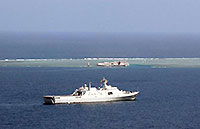US open to complete troop removal after 2014
(Agencies) Updated: 2013-01-09 10:18SHOULDN'T JUST "LEAVE THEM"
US officials have said privately that the White House had asked for options to be developed for keeping between 3,000 and 9,000 troops in the country, a lower range than was put forward initially by General John Allen, the top US and NATO commander in Afghanistan.
Allen suggested keeping between 6,000 and 15,000 troops in Afghanistan.
Retired General Stanley McChrystal, a former US commander of the Afghan mission who resigned in 2010, said in an interview with Reuters on Monday there was a value to having an overt US military presence in Afghanistan after 2014 - even if it wasn't large.
"The art, I would say, would be having the smallest number so that you give the impression that you are always there to help, but you're never there either as an unwelcome presence or an occupier - or any of the negatives that people might draw," he said, without commenting on any specific numbers.
The United States now has about 66,000 troops in Afghanistan and Rhodes confirmed there would be steady reductions in troop levels through 2014.
Also on the agenda for the Obama-Karzai talks are tentative reconciliation efforts involving Taliban insurgents. Those efforts have shown flickers of life after nearly 10 months of limbo.
Still, hopes for Afghan peace talks have been raised before, only to be dashed. Last March, the Taliban suspended months of quiet discussions with Washington aimed at getting the insurgents and the Karzai government to the peace table.
Washington has also had a strained relationship with Karzai, who in October accused the United States of playing a double game in his country by fighting the war in Afghan villages instead of going after those in Pakistan who support insurgents.
Karzai will give a joint press conference with Obama on Friday and will visit the Pentagon on Thursday, meeting with Defense Secretary Leon Panetta and the US top military officer, General Martin Dempsey.
Still, it is unclear what, if any, concrete agreements might emerge from Karzai's visit to Washington.
Michael O'Hanlon, a defense analyst at Brookings, cautioned against expecting too much from the visit, which he said is best seen as an opportunity for Washington and Kabul to "shore up this partnership that has had such a troubled status and a weak foundation."
"There are a lot of scars in this relationship. There are a lot of hurt feelings," O'Hanlon said. "It's sort of like a bad marriage and it's very easy for just the wrong word to immediately set people off in an emotional way."







